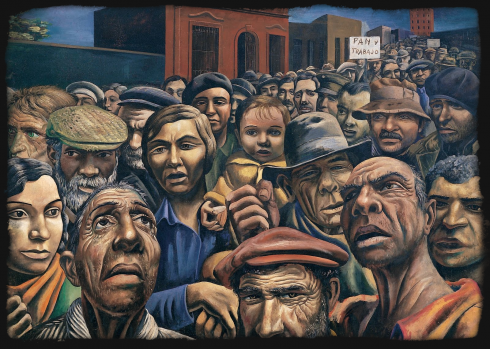
Triton, moon of Neptune. NASA photo.
“Violence so permeates society that popular pleasures are organized around an ‘aesthetics of vulgarity’, with the state staging public rituals in which ‘the masses join the madness and clothe themselves in cheap imitations of power to reproduce its epistemology’, and when power, in its own violent quest for grandeur, makes vulgarity and wrongdoing its main mode of existence.”
Achille Mbembe (quoted by Randy Martin in Empire of Indifference)
“Women are not drawn to indicators of evolutionary fitness. If they were, they’d be all over me.”
Elliot Rodger
“(fascism is) the sum total of all the irrational reactions of the natural human character.”
Wilhelm Reich
“What needs to be recognized is that the problem lies in the lack of an authentic self; narcissism is merely a symptom of this condition, not its cause. In order to deal with a deficit in a patient’s feelings, therapists must first realize the person before them is completely incapable of feeling.”
Arno Gruen
I lived for a few months, forty years ago, in Isla Vista, California. The University of California at Santa Barbara is situated there. I snuck in a couple times to hear Hugh Kenner lecture. I wasn’t enrolled. I was hanging with my girlfriend of the time (who wasn’t really enrolled either). She painted. I didn’t do much of anything, but go to the beach and lay around. Its beautiful there on the coast. Once Chumash villages dotted that coast, and later it was land granted by the Mexican government to Nicholas Henry Den. Over fifteen thousand acres in fact. There was a flood in 1862, which destroyed the livestock. Den sold the land. The U.S. military, as its want to do, purchased most of it. A Marine Base was situated there (well, in Goleta) during WW2. Goleta and Isla Vista are adjacent to each other. In the early 70s when I was there, it was a sleepy coastal California town with a newish and minor campus of the U.C. University system. It was the southern cali answer to UC Santa Cruz. There was a Rexall Drug Store, and an independent book store. I spent a lot of time in that book store. There was a small tobacco and pipe shop, and a few typical health food co-op markets. Today all of that is gone. The Redevelopment Agency is gone, too. The RDA could have redirected tax monies for infrastructure improvements. Isla Vista has, over the last three decades, given little thought to organizing the spike in student enrollment. The student body has doubled since I hanging around there. The Magic Lantern theatre is still there, but owned by the University. The Bank of America Riots in 1970 marked a change in administrative thinking, probably. I arrived right after that. But like I say, I wasn’t there long. It was quiet and seemed always sunny, and had remarkable sunsets. It was a place I recall as hedonistic and chill, and you could buy organic Basmati rice back when Ralph’s didn’t carry such things. Today they approach 25 thousand students, 76% of which are white, 23% Latino, and 17% foreign born. Its a white school mostly. Always has been. Nearby Santa Barbara is one of those reactionary enclaves of white wealth that dot the California landscape. Reagan loved Santa Barbara, had his ranch nearby. I think one reason I always loved Cutter’s Way was that it captured something of the languid quality of that city, as well as the nasty pinched white millionaires who run the place. Back then I would go to State Street in Santa Barbara proper, to eat at one of the small Mexican restaurants down by PCH. Those and the migrant workers who ate there and cooked there are all gone now. Its GAP and Burger King, and a few fern bars. This last week the latest mass shooting took place in Isla Vista, by a young man who ‘was’ enrolled at UCSB. Elliot Rodger comes across like a lot of other privileged children I knew from families whose primary work was the Hollywood film and TV industry. Startlingly familiar in fact.

Isla Vista, CA.

State St., Santa Barbara, CA. 1950s.
A recent mass killing case, that of George Sodini makes for an interesting comparison.
Elliot Rodger made a video. A startlingly narcissistic bit of performance. What first strikes one is that Rodgers pathological make up reflects the pathology of the ruling class over all. Narcissism, projection, lack of empathy, misogyny (obviously), loss of affect and a mirroring of autistic process, and a deeply entrenched raw festering self hatred.
Rodger wanted girls. Sex. Except he didnt have much idea exactly what that meant. Sex was pornography. More important was possession. Status. Power. A BMW needs a trophy girl. Rodger apparently frequented ‘How to pick up girls’ sites, and body building magazines. But this son of great privilege exhibited no curiosity about the world. As my friend Exir pointed out (in the last postings comments section) Rodger could only think in the most generic way about what he desired. He dreamed cliches. And not even, from what we know, very convincing cliches. He obsessed about being an Alpha Male, without quite knowing what this meant. This is the world of an evaporated imagination. Rodger wanted a cyborg girlfriend. He wanted to live in a graphic novel. He thought only terms of accoutrements.

Peter Kayafas, photography.
“Popular culture is largely colonized by corporations and is increasingly used to reproduce a culture of consumerism, stupidity, and illiteracy. Mainstream popular culture is a distraction and disimagination machine in which mass emotions are channeled towards an attraction for spectacles while suffocating all vestiges of the imagination, promoting the idea that any act of critical thinking is an act of stupidity, and offering up the illusion of agency through gimmicks like voting on American Idol.
… There are a number of registers through which popular culture produces a subject willing to become complicit with their own oppression. Celebrity culture collapses the public into the private and reinforces a certain level of stupidity. It infantilizes as it seduces and promotes a kind of civic death. Surveillance culture undermines notions of privacy and is largely interested into locking people into strangulating orbits of privatization and atomization. A militarized popular culture offers up the spectacle of violence and a hyper-masculine image of agency as both a site of entertainment and as a mediating force through which to solve all problems. Violence now becomes the most important element of power and mediating force in shaping social relationships.”
Henry Giroux
Aesthetic resistance is not simply the awareness of history, but the ability to use history, to inform and grow an awareness of the world around one, and to fashion Utopian futures, and to awaken from the numbness of advanced capital. Culture is meant to stimulate curiosity, for the lack of curiosity today in large numbers of the young is staggering. The architecture of the city today is one of a militarized zone where conflict is to be expected. I cannot think of one, not one, studio film or TV show in which surveillance, for example, is not treated as absolutely positive, as a tool for protecting people. Nobody writes TV drama in which people must be protected from the police. Never once ever have I seen a show or film in which questions of privacy are raised. Where the Orwellian aspects of surveillance are raised (unless one includes the odd sci fi futuristic fantasy, and then it only rarely occurs). So pervasive is the belief in institutional authority and white male power.
“…the extent to which American movies have become a self-reinforcing system driven by white male executives and producers convinced that they know what the audience wants, and also the extent to which they are, in a sense, correct: The audience has been conditioned, over the decades, to expect a certain kind of male-oriented stimulus and spectacle, a cinematic grammar of “violence, sexual conquest and macho swagger,” in Hornaday’s phrase. One could go so far as to say that mainstream cinema is a gendered cultural form, something that Oscar-winning pioneer Kathryn Bigelow, director of the controversial action films “Zero Dark Thirty” and “The Hurt Locker,” understands and has turned to her advantage.”
Andrew O’Hehir

Outskirts Houston. Chris Gielen photog. (Uncube magazine).
Complex narrative structure is met with bewilderment, if not hostility. The audience is so deeply trained for passive reception, that the demand for engagement, on any level, is met with derision. The snark culture. The fan is getting to experience their own private mini privilege. A privilege without material reward, but no matter. There is a feeling of control in getting to choose the channel you want to watch. Never mind every channel essentially shows the same thing. All of it is predicated on a model for society that Elliot Rodger lived in, in which his imagination atrophied.

Nandipha Mntambo
There are some exceptions in corporate TV that warrant a mention here. Two of them developed by Sundance (sort of surprisingly). Rectify, and The Red Road. Both in different ways provide something of an alternative vision of American society. They examine institutional corruption, and a culture of masculine violence. And both provide a sense of the deep alienation found for many on a daily basis. For that is the real story of Elliot Rodger. Beyond the deep toxic misogyny, Rodger was additionally a child of consumerism and reification. Treat your friends like appliances and your appliances like friends (Russell Jacoby). The rise of militarism coincides, both as cause and effect, with a fear of women. The Christian conservative features writers like David Murrow, who has compared a failure to denounce the effects of the mother to Norman Bates in Psycho. The threat of minorities and women is expressed in a belief that masculine power is required to restabilize society. George Sodini, the killer who walked in a fitness center in Pennsylvania and shot three women dead, and wounded ten, kept a diary that recorded his deep racial resentment and confusion, and a core fear and hatred of women.
“I have slept alone for over 20 years. Last time I slept all night with a girlfriend it was 1982. Proof I am a total malfunction. Girls and women don’t even give me a second look ANYWHERE. There is something BLATANTLY wrong with me that NO goddam person will tell me what it is.”
George Sodini
Also in Sodini’s diary:
“I predict I won’t survive the next layoff. That is when there is no point to continue.”
Reaganomics coincided with a rise in individual shooting sprees. The difference between Sodini and Rodger is firstly class. Sodini was middle class, but also white and had a good enough job. But a job that also included submission and boredom. Sodini also, most interestingly, wrote this:
“While driving I radio surfed to a talk show. The caller was a 30ish black man who was describing the despair in certain black communities. According to him, life is cheap there because you are going to die anyway when you get old. It is the quality of life that is important, he said. If you know the past 40 years were crappy, why live another 30 crappy years then die? His point was they engage in dangerous behavior which tends to shorten the lifespans, to die now and avoid the next 30 crappy years, using my example. The host got sarcastic and ended the call instead of trying understanding his point. Agreement wasn’t necesary. I put music back on. But it was an interesting, and useful point for me to hear.”

Antonio Berni
Sodini was in great pain. Rodger seems incapable of great pain. Both felt rage. Both directed that rage at women. But it is also interesting to read reactions in media to these events. The collective lynch mob rage is triggered. Very little effort is spent in understanding these events, beyond the idiotic anti gun sentiments of a liberal class. This is a society that now not only practices torture (well, one could argue has always tortured) but creates entertainment out of it. Torturing “bad guys” (criminals, terrorists, suspected terrorists, etc) is routine in studio film and TV. In fact, its hard to go a day without seeing a show in which someone is tied to a chair and being tortured. Torture is perhaps the purest expression of repressed sexuality. During Jim Crow, black women were raped by white men, and black men were lynched for violating white women (and often for no real reason). There are reasons race and misogyny intersect.
Adorno wrote of the authoritarian personality that they shared a belief in conventionalism of thought, aggression, submission (sado masochism), anti-interpretation, obsession with gender norms, cynicism, fascination with power (and destruction) and sexual repression. The fascist, repressed himself during childhood (almost always) is particularly upset at the idea of ‘others getting away’ with licentious behavior. The fury triggered at the idea of those getting away with something is also projection. And projection is rising as a tendency within western society today. Obama’s West Point Speech might be a textbook example of projection.

Susan Frecon
The submission to authority is double sided, of course. While projecting onto those seen as ‘not pulling their own weight’, as being needy and parasitic somehow, the authoritarian represses his own weakness, his own submission to bosses or leaders or institutions. The toleration now, of same sex marriage, is acceptable because the marriage institution is itself so repressive. As long as the institutional authority is validated, the moral uncertainty is accepted, to a degree anyway. After all, society is reinforced through marriage, and not through freedom. Better to let ‘them’ get married, providing at least partial integration in the paternal state power. They can be allowed to mimic traditional marriage and values. Additionally, one can see in most expressions of institutional power, narratives that sink to the most simplistic and sentimental. Same sex marriage is *sold* to the public with kitsch images and sentimental storylines.
There are new levels of disconnect today in the West. Elliot Rodger, in one sense, is a poster boy for this. Rodger’s stunted imagination was self enclosing. What did Elliot Rodger dream? I can’t quite imagine. He lived in the new fortress city (per Mike Davis), and he lived and interacted primarily on-line. Sandy Hook shooter Adam Lanza exhibited a similar disconnect from the real world. Rodger was, I’ve read, diagnosed as high end Aspergers. But his de-socialization cannot really be explained by this. And it also raises questions about why all those shrinks his parents paid for didn’t think to help him with this social awkwardness. The Aspergers tag is, again, for families like the Rodgers, another accoutrement. Another identity fashion of the bourgeoise class. (And yes, there is no question about real sufferers of Autism, even those high functioning, and this becomes an interesting secondary discussion for if the society as a whole has taken on qualities associated with autistic perceptual processes, then perhaps one needs to find better definitions for all of this.)
“The suppression of the sexual activity of children and teenagers is the basic mechanism which produces the characterial structures adapted to political, ideological, economic control [… ] The repression of natural sexuality in the child, particularly of the genitality, makes the child apprehensive, timid, obeying, apprehensive in front of the authority, ‘nice’, ‘quiet’; it paralyses its rebellious tendencies, because the rebellion is associated with anguish; by inhibiting the sexual curiosity of the child, it causes a general confusion of its critical sense and of its mental faculties.”
Wilhelm Reich

Julie Blackmon
The character armoring Reich described has become something else, to a degree anyway. Elliot Rodger could not give, or perhaps more importantly, receive love. What did he enjoy? His BMW? Doesn’t seem like it. It is probably good to access Klaus Theweleit at this point. His study of the German Freidkorps, fascist militia formed after WW1, is pretty relevant right now. One of Theweleit’s insights was that two things stood out as causes for insecurity and fear among these soldiers. One was the aquatic, and the other was dirt. Threat was described, very often, by resorting to metaphors of liquidity, The fear of losing onself was described as being carried away by a river, or washed away. The second, dirt, was associated with the enemy, the demonized Bolshevik or outsider, and with disease. Women came in two forms; red and white. The White was the nurse, the school marm, the sister. Sexless and chaste and patriotic. The Red was a Commie whore, essentially. And the Red was described in, again, symbolic terms associated with water and fluids. Sexual ecstasy was a whirlpool sucking the militia cadet downward, into sin and moral slime. The fluid was a threat to stability, to personal stability and social stability. Now, this suggests a lot of what is already clear; the fascist must repress his own weaknesses and project them outward. Sex is dangerous. It is stigmatized as unclean and those who enjoy sex are also unclean. Women who have sex with communists, blacks, latinos or Asians are particularly filthy. Most mass killers could be seen to fall into the Freidkorp critique. Elliot Rodger however, strikes me as a more post modern version of this, but still essentially a product of authoritarian thinking. He was so utterly unable to form an ideal, to make his desire take some recognizable shape, that his violence was in the end very immature in his verbal expression of it. He could not grasp why he could not have what he wanted….except he didnt know what he wanted…not quite. In a sense his rage was ‘why dont I feel what I want’? He knew a few generic versions of want, in his photoshopped imagination. But he did not really understand what connection meant, connection to other people. I suspect Rodger feared intimacy, greatly. I cant get what I deserve, for Rodger, was I cant get someone to explain what I want, and then give it to me, and I will feel passion.

Yutaka Sone
Elliot Rodger’s object choice, his feminine ideal, was not even a cinematic fantasy. It was a pre-fantasy. It was a category that his class and upbringing had provided an awareness of, but one that he couldn’t fill. It was a mail slot at the office without any mail. Rodger knew, or suspected strongly, that other people got mail. He didn’t. His empty category of desire was rendered (literally almost, if we use that cooking metaphor) into a vindictive rage against those he guessed, could only guess, were failing to complete his picture of desire. His picture of himself. His class, his racial and economic background meant somehow or other he should have a sexual trophy. He had no idea what emotions are connected to sex. His emotional palette feels limited to petulance and self adoration. Again, though, his self adoration was generalized. What had he done? He had a nice sweater from Neiman Marcus. A nice car. Love me for I shop at Neiman Marcus.
The idea of pleasure becomes a germane question when the crimes of an Elliot Rodger (or Adam Lanza) come to the attention of the public. Elliot Rodger is familiar because we’ve all seen him on TV, in fictional crime drama. Part of his persona feels scripted, by hack writers and his very grammar is that of a cliched TV show. There is a feeling watching Rodger’s video that we’ve seen it before. And we have. Therefore the idea of enjoyment when watching crap recycled TV cops shows is transferred over to watching the new True Crime show, The Elliot Rodger video. And its 24 hour a day news cycle set of reviews.
Friends will be interviewed, parents talked to, and the images….the endless circulating images will finally coalesce into one or two iconic images. Horror becomes irony. Horror becomes entertainment.

Mark Grotjohn
The cult of shopping, of commodities, justify domination. Look, I have a nice BMW. The depersonalized ego can only relate to a vague collective sense of guilt. There was no person to individualize guilt. Elliot Rodger related only to generic categories of anything. There was no self, no viable ego.
For Elliot Rodger, I suspect, the sexual had been double sublimated; or rather the frozen embalmed ego served only a morality of aggression and domination. There was no play, no fun, only a fractured libidinal tension that erased the body. Elliot Rodger had no body, only a repressive process that produced lack. Killing women served the reproduction of domination. That this power was illusory was irrelevant.

Masolino DaPanicale. early 15th century.
I wanted to end with some very useful bits and pieces. Manyfesto’s excellent piece on nature of Imperialism.
http://manyfesto.org/2014/05/29/on-the-urgent-necessity-of-anti-imperialism/
and then this bit of background on US meddling in Ukraine, on Pussy Riot and US state department.
http://fables-of-faubus.com/

this is terrific
let me just alsorecommend Andrea Smith’s Conquest
http://www.amazon.com/Conquest-Sexual-Violence-American-Genocide/dp/0896087433
andsomething to measure the distance travelled culturally
http://www.youtube.com/watch?v=m0fHKbDok_A
but wow yes, Imperilism and Antidespressents
Ithink many (not all) of thesekids diagnosed as aspy — a syndrome, that I doubt has anything really to do with autism — are somehow blocked off from “the other condition”:
“The uncertain history of this division in human experience has unfortunately never been pursued and portrayed without prejudice – whether by rationalist hair splitters or addicts of religion. It seems, however, that a bifurcation runs through the whole of human history, dividing it into two spiritual conditions, which, even though they have influenced eachother in many ways and entered into compromises, have nonetheless never properly mixed with eachother. One of the two is familiar as the normal condition of our relationship to the world, to people, and to ourselves. We have evolved – if one were to describe this condition in relation to the other – by means of the sharpness of our mind to what we are: lords of an earth on which we were originally a nothing among monsters. Activity, boldness, cunning, deceit, restlessness, evil, a talent for the hunt, lust for war, and the like are the moral qualities to which we owe this ascent. Today we demote these qualities to the status of vices as soon as they appear in excess within our communities of interests; but they dominate the interactions of these unions of interest with each other as they always have (war, exploitation, and the like): and – what is far more difficult to change – they penetrate even the spiritual attitude of people in our civilization to the ultimate degree. Measuring, calculating and tracing, that positive, causal, mechanical way of thinking that is so often held against the people of our day, is an expression of the same aboriginal mistrust and struggle for existence as the dominant role of money as regulator of the world in which only the lower qualities of the human being count as solid and calculable; money is to be used, so to speak, as the only reliable material for constructing society. The popular task of ‘improving’ man is far more difficult than is generally assumed; it cannot be done just with the popular attitude toward avoiding evil, for without his evil qualities there is nothing left of the human being that we are but a formless heap. Even morality itself is, in its most profound nature, totally alloyed with and compromised by the sharp and evil basic qualities of our spirit; even its form, as rule, norm, command, threat, law, or the quantifying and weighing of good as well as evil, reveals the shaping influence of the metric, calculating, mistrusting, annihilating will of the spirit.
In contrast to this spiritual conditions stands another, no less demonstrable historically even if it has left a less powerful imprint on our past. It has been characterised by many names, all of which are vaguely in agreement. It has been called the condition of love, of goodness, of renunciation of the world, of contemplation, of vision, of approach to God, of entrancement, of will-lessness, of meditation, and many other aspects of a fundamental experience that recurs in the religion, mysticism and ethics of all historical peoples as universally as it has, remarkably, remained undeveloped. This other spiritual condition is always described with as much passion as imprecision, and one might be tempted to see in this shadowy double of our world only a daydream, had it not left its traces in countless details of our ordinary life and did it not constitute the marrow of our morality and idealism lying within the fibrous threads of evil. Today, if one does not have one’s own thorough researches as a base, one must renounce the temptation to try to say more about the nature and meaning of this other condition; for until recently our knowledge of it was about as extensive as the rest of our knowledge about the world in the tenth century. But if one simply extracts a few main, common characteristics from the purely descriptive accounts of a literature that is thousands of years old, one finds again and again the presence of another world, like a solid ocean bottom from which the restless waves of the ordinary world have drawn back; and in the image of this world there is neither measure nor precision, neither purpose nor cause: good and evil simply fall away, without any pretense of superiority, and in place of all these relations enters a secret rising and ebbing of our being with that of things and other people.”
– Robert Musil, Toward A New Aesthetic
@molly:
Yeah, I think if a person call tell me they are autistic, then they arent. They are something else, and it very well may be real, but I think this model, this spectrum is full of contradictions. Much like ADHD. These are diagnosed in a vacuum. Or rather the frame is a manufactured reality, a picture of the ‘real’ that doesnt exist.
The interaction and interdependencies between propaganda and behavior, and then medication is being reduced to these simplistic formulas that simply make no sense.
Great quote by Musil.
But there is something being noticed, right, in about half the people called aspy…the Bill Gates type. There is no sexuality but there is this heeheeheee prurience. All is fetishism and voyeurism. At the same time there is the inability to synthesize – to produce a world. The impulse is to fragment all stimula, ignore most, focus on one thing, in a fetishistic way. Sift all phenomena for the signs of certain cues onto which the ego is trying in vain to cathect. Ignore everything else in a kind of mental exterminism.
Right. But looking at it from the perspective of the environment they live in, and this is why things like architecture fascinate me so much now, in addition to electronic media, but just the idea of space, and how children are introduced to the tools for processing space, and things like fear,etc, seems to me highly significant in all this. Because fear isnt the same if your exposure to the world is truncated the way it is for many of these kids. I said before a teacher here in norway (which isnt the US, mind you) found her grade school kids had trouble evaluating weights. No sense , ahead of time, of what something weighed. The asperger diagnosis suggests an elimination of background ‘noise’. Things are percieved more in isolation, but then the enviornment presents things more in isolation today I think. Its a real question I think how the new fortress city, and imperialist mind set, and how surveillance affects the young.
that’s really interesting
judging plausibility is also impaired
they can be gulled easily
Good points in the article, I just wanted to respond to a few things that bother me in the comments:
The fact that Elliot Rodgers was diagnosed with Asperger’s is besides the point. There are plenty of women and black men diagnosed with Asperger’s, and yet they don’t go on shooting rampages. In fact, the mentally ill card is often played by the media precisely to distance the messed-up nature of mainstream misogyny and turn violence into an individual problem separate from the patriarchy. (“Just a lone crazy gunman”) And so, the dehumanisation of saying that people with Asperger’s are somehow cut off from “the other condition” — no, NO. It’s being in power, being in privilege, being entitled that cut you off from “the other condition”. NOT Asperger’s. In fact it’s so common in society to equate Asperger’s (or plenty of other mental illnesses or neuroatypicality) as somehow meaning that these people can’t feel human emotions. That they have no emotions. (“Oh, if they think and feel in a different way from what normal people do, it must mean that they actually have NO emotions. Because I can’t understand their emotions, they must have none.”) That’s NOT Asperger’s. And mentally ill people are far more likely to be victims of violence, institutional violence, than they are perpetrators. In fact society spreads the image of the violent inhuman mentally ill person in order to continue this institutional violence. Read how psychiatry has treated autistic people in the past, and still do, the sort of conditioning treatment that treats their patients as animals and not full human beings capable of feeling, all based on the belief that they don’t have feelings, or a connection to the “other condition”, whatever.
So what if some of these white male shooters had mental illness? It simply meant that this mental illness coincided with their privilege and power. That the same mental illness in any other demographic would end up resulting in oppression. And even then there are perfectly sane people, like the Unabomber. The Unabomber had no mental illness. Being in power and having access to power makes you a monster. Not some neurological condition.
“Yeah, I think if a person call tell me they are autistic, then they arent. They are something else, and it very well may be real”
Uh…………………
If a person can tell me they are clinically depressed, then they arent. They are something else, and it very well may be real.
If a person can tell me they have cancer, then they dont. They have something else, and it very well may be real.
Just because someone has Autism doesn’t mean they don’t have self-awareness or self-consciousness. Sure, SOME forms of Autism might include that — but even there I’m very suspicious about the typical psychological manual definitions because they so often simply repeat the canard about mentally ill people having no self and therefore no humanity. But even the mainstream institutional oppressive psychiatric manuals would acknowledge that Autism is a range, and on that range are autistic individuals who have the ability to be self-aware and have the required verbal skills to express them. So, yeah…
So much of the institutional brutalization of people with mental illnesses come from the paternalistic “you don’t know what’s good for yourself, we know you better than you know yourself”, and part of that rhetoric includes the whole “if you can name your own condition, it must mean you don’t have it!”. I’m NOT saying that’s what you believe, far from it, but just that this rhetoric does contribute to those who do believe in their rights to oppress the mentally ill.
That’s the problem I have from time to time on this blog where autism is just casually thrown around as a sort of metaphor for society. OK, first off, autism doesn’t have much to do with how an individual is conditioned by stimuli. It’s not like you get put in a Skinner box and you come out autistic. So, I wholeheartedly agree that the hyperbranded, hyperconsumerist, hypercommodified world (and your observations about people losing the ability to measure weight, which is quite salient) is a huge huge problem. But it’s not autistic, not even close. It has very little to do with autism.
But beyond this, it’s that things like autism is a favorite scapegoat by society precisely to maintain the normality of their invisible oppressive structures. If you can scapegoat the mentally ill and the neuroatypical, and say they are the Other, then you can wash your hands and go “well, it’s not Us, it’s Them, see? We’re perfectly OK here.”
And again. People in power, for the most part, are NOT autistic. They know exactly what they are doing, and they make a very sane decision to oppress and hurt other people. They don’t care, for selfish reasons, not autistic ones. Not even close.
@exir……..first off, you have to be careful not to put words in my mouth. I made clear that my position about ‘if you can tell me you have autism, you dont’ is that what you have that is called aspergers, should be defined, seperated, from severe autism because I dont buy the spectrum model. And at the aspergers end of it, the so called high functioning aspergers, Im not sure there is a condition of any sort, in any way connected to the other end of the spectrum (this is where RD laing needs to re read i suspect, and thomas szasz). And the idiocy of comparing that to, oh if I say i have cancer i dont, is beneath you and so egrigiously simpleminded that Im stunned YOU said it. Now where did I say , WHERE…this shit really bugs me…WHERE did i say anything remotely like what you accuse me of? Did i refer to this killer as a killer who was ‘just crazy’? For fuck sake, the entire positing is doing the exact opposite of what you accuse me of doing.
And no, being mentally ill, whatever that means, is never beside the point. And mental illness is a contested topic because Ive almost never bought into clinical definitions. Partly because they have, in the past, been applied to me in the service of the criminal justice system.
The cut off is caused or the result of several things (again the entire point of the article). And of the comments. This is the second or third time i ve gotten this irrational confused response about autism. Who is blaming autism? Find me a single syllable where I blame autism or austistic people for anything? This is the hyper paranoia of a certain political correctness, frankly. Ive never said any of these things and I defy you to quote me a passage in which Im suggesting any such thing. Go ahead, Im waiting.
But…..and Im sort of amazed I have to explain this again…AGAIN…..but NO IM NOT THROWING AROUND==CASUALLY== AUTISM AS A METAPHOR FOR SOCIETY. jesus god….really exir…..you should be embarrased for such careless reading. Its not a metaphor FOR society. Society is not autistic. Society…..is, i believe, increasingly processing the world in ways that mimic autism. Not in all ways, but in many ways. And Im hardly alone in suggesting this. Now one can argue, as you seem to be doing, though its hard to tell, that autism isnt about stimuli……….well, beyond the fact I didnt say that, Id argue in some ways it interacts with stimuli. The background filters and selective focus etc. But again, nobody said hyperbranding was autism. Not me, nobody here. So this sort of wringing of hands about scapegoating autism is more about a group think that says oh, such metaphors are……I dont know…….inherently scapegoating. And probably more about you., Deleuze used schizophrenia metaphorically, as an example, but I dont recall people calling him out for blaming schizophrenics for society’s ills. This post is 3000 plus words describing a culture and a white privilege that create characters like elliot rodger, and adam lanza, but in different configurations. That culture includes consumerism, and architecture as enclosure, and also narratives of ever simpler sorts that simply reproduce the style codes for narrative. Prospectus for a narrative becomes the actual narrative, and in some ways, these overly simply narratives, which outline very simple tensions and conflicts, if they even do that, seem to mimic something of this aspy quality of communication. Its also now the designation du jour for a certain class. None of this is blaming autistics for anything. Its fucking hopless I think for me to explain this any more. And your note is insulting and rather stupid, honestly. I dont want to be told I said something I didnt say. Ive never said. Never. Go ahead, quote me….anywhere on this blog at anytime, anyplace that i have said any of the things you just accused me of.
To challenge me about failure to criticize power makes me think you have been abducted by aliens.
http://www.nytimes.com/2005/07/31/books/31MORRICE.html?pagewanted=all&_r=0
additionally, one of the aspects of collective metaphoric mirroring is in the failure to read metaphor itself. Most mildly *autistic* people often relate the difficulty of reading sub text in conversation, and in narrative.
Here is an excert from someone diagnosed with aspergers:
I’m terrible for taking people literally, I would say my most common response to conversations between people at work is “are you being serious?” the other day my mum had a right laugh when we were chatting about me putting money into an account for my dad because I’m living at his house and he needed to use it on his car repair bill so she said well at least he had it there for a rainy day and now it’s definitely raining. I looked outside and said but it’s not raining, it’s sunny out she meant metaphorically and then I realised after all these year that a “rainy day fund” meant for when things were bad. I never realised that…”
this is very like the one dimensional quality of western society….in ways beyond just reading sub text in conversation. Its about reading space in these truncated and abbreviated and even distorted ways. Sort of the way aspergers read sub text…or dont. Its a similar need for slow motion and surface. How does that suggestion insult people with autism? The society of domination has done nothing but condition its populace for fifty years to be one dimensional and obedient. Elliot rodger didnt kill because he was aspergers…..but his process reflects something about society, and it is useful to see his particular cutoff, his privilege (which allowed him to do certain things a poor kid with aspergers couldnt…(whatever aspergers actually is……if its even autism somehow). All of it makes up this fabric of disconnect.
Hi exir
I agree that its important to avoid any kind of demonization of mentally ill people. Yet I don’t think we can permit this worry to prevent us from questioning Aspergers and the status it has attained as an illness. Austism is one thing, but the so called “autism spectrum”: is a handful of diagnoses with little material evidence underlying them, no clear connection to Austism as it was first understood, and it’s a way of classifying and pathologizing a range of behaviours that are very unevenly detected and impacted by class and other factors.
And for example one of the things that is diagnosed – in this case and many others – as Asperger;s is this white supremacist egotism. That’s the symptom that is giving the diagnosis. There’s a clear connection between these kinds fo shooting sprees and drugs that manipulate serotonin. That creates a correlation with the asperger’s diagnoses. But the type of emotional problem that is being diagnosed in these cases IS characterized by lack of empathy as well as difficulty managing complex stimuli. That’s the main symptom that leads to the judgement and label Aspergers.
Right now of course all kinds of kids with no mental illness are diagnosed with Aspergers. Anyone who is “non compliant” – bright kids bored at school, politically disobedient kids, etc.. What the forcing on them of drugs does is not really known but obviously the drugging is causing the kinds of symptoms psychiatry is supposed to alleviate or cure. If its induced by psychoactive chemicals, the symptoms of aspergers might be treated as a drug reaction rather than aspergers although aspergers is nothing but a syndrome. I wonder what would happen if it were discovered asperger’s symptoms could be induced by exposure to certain kinds of audio visual stimuli. I don’t think there is any real theory about origin of Aspergers symptoms. It;s dangerously being trasnformed into an “identity” — after this scary fashion of political punditry – https://www.jacobinmag.com/2014/06/pink-collar/ – so that opposition to the infliction of Aspergers on people is confounded with a desire to harm people with Aspergers. This kind of discourse will end up very soon transforming opposition to poverty into a condemnable bigotry against the poor, prison abolutionism into an eliminationist hatred of prisoners, the way antisex work feminism has been characterized as “whorephobia”.
finally, Williams Syndrome….just to push this metaphor thing a bit further, is studied in relation to how children learn metonymy and metaphor AND spatial relations. High vocabulary skills, coupled to low cognitive skills. This is a rare condition, but its being studied in relationship to Aspergers……..the ways in which preferential pointing comes , developmentally, in a different sequence from learning about sub text, literalness, etc.
These studies are revealing in that they suggest the development of certain kinds of vocabularies, but the lag in spatial understanding, and even bigger lag in metaphor and metonomy comprehension, is connected to advertising and commodity form, and reification. How can it not be? They tested kids with williams using picture stories….comic strips without words, and tested metonyms after. I mention this because if these conditions are on the rise, and apparently they are…however rare…then there is a connection between how society is presented with reality, with space, how it sees itself housed and protected, sheltered, and how it is encouraged to NOT read beneath the top text, not to see metonyms or metaphors. And the reproduction of these tendencies.
OK, I should have made myself clearer, I don’t think you are demonizing autistic PEOPLE. It’s that the metaphorical use of autism, being a sort of simplification and distortion of how autism actually affects people plus singling out and exaggerating a few isolated aspects of autism (or a stereotype of autism, really) that seems to correspond to what’s happening in society, corresponds to the same simplistic stereotype used by those who DO demonize autistic people. Nothing more. The aspects of the stereotype of “the autistic mind” that you are using for the purpose of making clear certain points you want to make on society are the same aspects of the stereotype of “the autistic mind” that other people, WITH DIFFERENT INTENTIONS, have used to justify demonization of autistic people. Same ammo, different targets. Nothing more.
When I talk about your use of autistic or Aspergers as metaphors, “seem to mimic something of this aspy quality of communication” is exactly what I mean. That IS using aspects of a psychological condition as a metaphor, and you DO do that from time to time.
I don’t think you are scapegoating people with mental illness. I just think that it does no good to say people in power are certifiably insane and psychotic, as you often do, because in the mainstream media when say a member of the ruling class has “gone rogue”, so to speak, done something that is too atrocious even by ruling class standards (or is bad PR), that is ALSO the first thing that they do — pathologize the activity, make it seem like a blip or something out of the norm. Again, that’s not what you’re doing, but… why reduce the banality of evil? Or, indeed, the basic sanity of evil in this world?
And look, I’ve never been a big fan of mental illness as illustrative metaphor because I simply don’t think it’s very useful. Deleuze’s use of schizophrenia as metaphor, for example, seems to have very little to do with actual schizophrenia. It’s a stereotype of schizophrenia. He makes good points, but his use of schizophrenia metaphors do very little for them, and in fact I think even makes them a little more obscure than necessary.
Also, my post was partially addressed to Molly. The whole thing about how many people with Aspergers are probably incapable of love and compassion was just, well, wrong. I’d be happy if it turns out it was my misunderstanding.
“To challenge me about failure to criticize power makes me think you have been abducted by aliens.”
I’ve never challenged your intentions. Am I not allowed to criticize some of your writing without having my personal character criticized? I don’t think I’ve behaved trollishly in the past, so I don’t understand why the fact that I’m commenting here in good faith has to be put in doubt. If I misunderstood you, we all make mistakes, and I don’t see why I should be belittled for making mistakes or having flaws in my logic, which we all do.
Just to clarify, that last comment was in reply to John’s first reply to my comment. I haven’t had a chance to read and digest the other posts that have been posted here since then.
“When I talk about your use of autistic or Aspergers as metaphors, “seem to mimic something of this aspy quality of communication” is exactly what I mean. That IS using aspects of a psychological condition as a metaphor, and you DO do that from time to time.”
and that is wrong? Using a psychological metaphor? Is wrong? And, no, I dont think Im creating a cliche of autism. I AM suggesting there are class and ideological influences, and political influences, and profit …..connected to diagnosis. Whatever aspergers is, its as molly says, a syndrome….but its also qualitatively different than what is usually defined as autism. Hence the new name. And i said you were abducted by aliens because you did just criticize my intentions and scold me for not doing what i HAVE BEEN doing for a year and a half now on this blog. I have no other explantion than aliens.
but…..id argue strongly that discussing society, metaphor, and metonym, with psychological conditions is perfectly valid….not only that, its this conditioned fear in people that makes them react the way, well, you react to this, but many others. Its very shortsighted not to discuss it this way. I mean, here you have white privilege, and emotional deadness (hence, by the way, the reich quotes) suddenly enclosed within a new condition, a new diagnosis. And hence this emotional deadness is apologized for and untouchable…..and if you go to psych journals on autism and aspergers now…..which Ive done a lot over this last year…..you hear people NOT diagnosed with aspergers labled as “neuro typicals”. I mean this is orwellian….this is huxley……its through the looking glass. Suddenly the very idea of illness is turned upside down the better to pathologize resistance, and to valorize lack of compassion and privilege.
And people in power ARE usually certifiabally insane. Do you think its not insane to order drone strikes on familes? To not care. You think its not insane to order the removal of aristide and shut down health clinics and food services for the poor….and reinstate ton ton macoute? Moral bankruptcy yes, but also, depravity and insanity. For if that isnt insane, Im not sure what is. You sound afraid to say certain things, frankly. Like all these touchy areas……best be careful not to say this or that. And that, THAT, is exactly the reason for the growth of labels and diagnostic categories……and I saw this with the turn in language used for addiction and alcoholism. Oh its a sickness. Well, no, its not a sickness, because TB is a sickness…..heroin addiction is not cancer. We cant call them the same thing. Because if we do, then words lose meaning. Im angry because you cant find me anywhere ive demonized anyone. And its frustrating that somehow those in power who go rogue (but who would that be? they cant do anything bad enough to be called out, unless its to give away money to the poor)….but so what? Why do i have to tailor my critique to adjust to maintream media. And i think thats wrong anyway. The only people pathologized are the poor. The only ones. Ever. Tony Blair or bush are not ever ever ever ever pathologized. Only third world leaders, or black or asian or latino……not EU leaders or north american. Not ever ever. Never. The merchant class, even if rich, can be stigmatized. Never the ruling class. But the point is that without grasping the class mediation of mental health, you play into the hands of those in power. And I would disagree about psychological metaphor. Society does now seem to mimic certain qualities associated with autism. I stand by that. Its exactly what it does. And ive tried to explain the reasons I think. You dont have to buy it, but Im quite content to stand by it. Its just interesting that of all the topics Ive covered in a year……..the only one people get upset about is Autism. What does that suggest?
1 other note. I dont like deleuze much. Some, but not much. But the question is why, WHY is autism cause for this moral hand wringing and hyper sensititivy…..but schizophrenia is not? Its irrelevant to what degree he used schiz as a metaphor or didnt……….nobody was being offended by it. But say the word autism and many people get offended? The answer, obviously, is because schizophrencs are just seen as kookoo…..tragic perhaps if its someone’s brother, but insane. Its almost the used as shorthand for crazy. Autism is not. Autism is a special and increasingly class mediated term. People are proud almost of such diagnosis. Bill Gates….etc etc…..its the hipster diagnosis too. This just occured to me, so i have to think more on this, but its the condition, mental condition, of gentrification.
“Its just interesting that of all the topics Ive covered in a year……..the only one people get upset about is Autism. What does that suggest?”
Maybe it suggests that people like me usually agree with the rest of what you have to say? You can take the fact that I’m taking issue with your characterisation of autism as a compliment, if you want. I don’t think it’s necessarily a symptom of anything.
And I had a chance to go back and read the other comments, and there’s a lot to respond to, so I’m probably not going to do the whole discussion justice. What Molly said, and you elaborated, about the changing criteria of diagnosis, and how the class nature of diagnosis has allowed certain privileges and lack of compassion to be enclosed in a sanctified diagnosis that must not be questioned, it was instructive, actually, and I haven’t thought about things that way. It does make a lot of sense. And I think what Molly’s reply mentioned about the danger of identity politics that conflates criticisms of conditions with criticism of people, that is exactly correct.
What you said about the autistic qualities of society, where the ability to read subtext is being eroded — the reason I think autistic metaphors don’t work is because there isn’t much in common between, say, a consumer being trained not to read the subtext of popular culture, and an autistic person not reading the subtext of a conversation. These are two totally different mechanisms at work. One is a matter of education and ideology, the other is a matter of literally not being ABLE. I mean, autism isn’t just behavior, it’s the mechanism behind the behavior as well. That’s why I think it’s wrong to use “autism” to refer to behavior that are similar to the behaviors of those with autism, if the behavior you’re comparing autism to is actually driven by a completely mechanism. And while there hasn’t been any conclusive answers about where autism comes from, you can’t just fill the void with speculations about how autism might be caused by social conditioning. The truth is, we just don’t know yet.
“And people in power ARE usually certifiabally insane. Do you think its not insane to order drone strikes on familes? To not care. You think its not insane to order the removal of aristide and shut down health clinics and food services for the poor….and reinstate ton ton macoute?”
OK, here’s my theory, and it’s not very well developed, but I’ll express it in the best way I can: the way society valorizes “sanity” as a virtue is tied together with how “sanity” is used to cover all manners of very oppressive microaggressive behaviors. In fact, you can’t be a 100% “sane” person in this society without being an oppressive person. The two are synonymous. So those in power are not insane… they’re hypersane. As in, their behavior is a logical extension of what society defines as “sanity”. Certifiably insane people don’t have access to drones and nukes. Society doesn’t even permit certifiably insane people from having control over their own lives, much much less over the lives of millions. THAT is what I ultimately object to about using the metaphor of insanity to describe the brutality of those in power. NOT out of some desire to cover ugly uncomfortable topics from critical scrutiny. In fact, the exact opposite.
Maybe it’s just a matter of me understanding words in a different sense than you. I don’t know how much of this is me disagreeing with you and how much of it is me not fully understanding the context in which you use some of your terms.
Actually, I always assumed that emotional deadness (lack of empathy) was always diagnosed under psychopathy, as a separate diagnosis, NOT Asperger’s. While Asperger’s had to do with an inability to read and understand emotional cues when expressed non-verbally, NOT an inability to empathize with and feel emotion for someone else.
Ok… first, I should probably use Aspergers rather than Autism, but I contest both definitions in the end. But here is the key issue:
“What you said about the autistic qualities of society, where the ability to read subtext is being eroded — the reason I think autistic metaphors don’t work is because there isn’t much in common between, say, a consumer being trained not to read the subtext of popular culture, and an autistic person not reading the subtext of a conversation. These are two totally different mechanisms at work. One is a matter of education and ideology, the other is a matter of literally not being ABLE. I mean, autism isn’t just behavior, it’s the mechanism behind the behavior as well. That’s why I think it’s wrong to use “autism” to refer to behavior that are similar to the behaviors of those with autism, if the behavior you’re comparing autism to is actually driven by a completely mechanism”
This also I might argue, on the face of it. But let me approach this differently. I mentioned Szasz because he was the first (or among the very first) to argue against the mental health industry. When psychoanalysis travelled across the atlantic it became a discipline of adjustment, AND a medical profession (read freud on lay analysis…and read russell jacoby’s Social Amnesia). The entire construct of mental health became based on adjustment. Today the therapy culture is about “making your life work”. Adjusting. And soon, big pharma found ways to create compliance. And we have chemical warehousing of *abnormal* behavior. On the one hand, there has been progress in the treatment and care of severely incapacitated subjects….bi polar or schizophrenics. On the other hand, there has been a severe trend toward pathologizing normal behavior. And medicating children to help ‘adjust’ them. But.,… getting to my real point here; autism and aspergers cant be, shouldnt be, looked at in a vacuum. Why are some people literally, as you put it, unable to read sub text, say? We dont know. Ok, well, if one doesnt know the origin of a condition but still creates elaborate definitions and descriptions and treatements of these conditions, it begs several questions. One is that we live in a real material world shaped by human history. People who cant read sub text because of educational conditions, marketing, loss of human contact are perhaps not so different from those for whom we describe as literally unable…… that we have no idea why they share this inability — and here it does in one way become metaphorical, but metaphor often contains within its expression something actual. What is the distinction? How is that determined? The effects of mass culture, of electronic media is also not really *known*. Both the aspergers and autistic individual and the conditioned consumer fail to read complex narrative in depth. Yet, one is validated for this in mass cultural narratives, the master narrative, and one is diagnosed as having this condition. Your second comment, about defintions of emotional deadness say, begs this question, too. I see everyone as a victim in a sense., Myself included. I dont read the way i read forty years ago. I read in a more fragmented way. This is perhaps neither good nor bad. But its true. Im sure there are countless other things Im not aware of. But identity is now being partially, if not wholly defined by labels. This is the regressive side of identity politics. As gore vidal said, homsexuality is what one does, not who one is. But this is the side of things in which these identities become brands. Im this and this and this. And im reminded of adorno’s piece on astrology columns — there is a subtext of submission to authority involved. And that runs across all of this. Society on the whole, in western cultures, feels to me to have narrowed its capacity for complex reading of stimuli, and certainly of narrative down to terms usually associated with autistics…or maybe i should say Aspergers. I had a friend whose son was autistic. Severely autistic. My wife worked with another man severely autistic. They were both simply very cut off. Both different, and probably for different reasons. But they clearly were unable to function by themselves. Years ago in Norway, such people were often left chained up in barns. So progress has been made. But now society is starting to mimic this cut off. Its validated in a certain class. Entertainment is ever more simplistic and infantile. Society is reinforcing a certain kind of immaturity. Elliot Rodger was treated,…..apparently, but in the end erupted in a violent massacre of young women. Why? Id say clearly societal values, the reinforcing and reproduction of white privilege, and misogyny, is part of the backdrop here. How much that informs this is open for discussion. But those who do not commit murder, but are just as cut off, emotionally, or just as unable to process complexity (and thats not even a value judgement at all….its just what it is) share something and are internalizing something, being shaped by something that is going on in society as a whole. If one accepts that this is a society of domination and control, if we accept surveillance as an expression of certain values predicated upon control of the masses, then its hard not to feel those diagnosed with aspergers and those not, are in the end part of the same composition of forces.
as for insanity and sanity. Yeah…..you just feel differently about the definitions. I think those terms are pretty meaningless actually. I dont know what sane means. Its a legal term mostly. What is anti social behavior? Hurting people I guess. But define hurt. Why is the unibomber sane and, say, ted bundy not? Why? What is different? I could compile a list of what is different but where would we end up? The US puts more people in prison than any country in the world and maybe more than any ever anywhere. In such a society, the relative meanings of sane and insane are pointless. And this is why…this idea that property is more valuable than human life…I have issues with distinctions between aspergers and just lack of compassion. The society as a whole lacks compassion. The society as a whole applauds violence. Especially white male violence. Im not casually tossing off definitions or metaphors. Im questioning the idea of such definitions, and suggesting the metaphor masks a deeper truth.
there is one other thing. And this is about instrumental thinking. The cult of science. The magical thinking of a lot of science. Junk science and junk medicine. When one says we dont KNOW the origin. That assumes its knowable. That one can know it, own it, possess it. I think using this default assumption can be dangerous. I used that NASA photo of Triton at the top for just this reason. Here is this moon……..jillions of miles away in deep space….bigger than earth. We have a photo of it. What do we know? We know, or guess, its made of this and that and it behaves a certain way. It can be predicted to continue to behave that way….until it doesnt. But do we know anything more about it than we did before just staring at the sky? I guess we know its there. But my point is that things like brain science always raise this question, too. Consciousness is no more comprehensible than it ever was just because we can map the synaptic explosions. Humans live in this amazingly complex matrix of forces. Mystery remains….as wittgenstein said, even if everything were explained (another autistic guy, by the by). So for me metaphor is not just a literary device. Im with Benjamin on this. It contains archaic traces of our history. How we navigate the world around us. And there must be a reason things occur, or many reasons, and we may not ever KNOW all of them. And that may not be bad. The current uptick in discussion about Aspergers (and two very popular TV shows with asperger protagonists) raises for me both political questions, and hermeneutical questions and even ontological questions.
OK, it’s clearer now to me. And I agree with most of these points.
I just want to add that the positive portrayals of some forms of Aspergers in the media (like the two popular TV shows you mentioned) does not necessarily mean that they valorize or even respect real people with Aspergers. I mean, the popular TV shows have a very fetishized portrayal of “Aspergers” that still basically assume that they’re Other, that they’re just… different… somehow. And this ties in with Bill Gates and other rich white people claiming Aspergers; he’s valorized for his wealth and power, DESPITE his Aspergers, not because of it. Just because Aspergers is less of a mark against you when manifested in rich educated white people, doesn’t mean society as a whole elevates or privileges Aspergers as a whole. I don’t actually think there’s been a great reversal in society’s view of mental health.
two interesting points here. The two shows…hannibal and the Danish version of The Bridge were somewhat different. In Hannibal the Aspergers character is seen as mystical almost, with special gifts. In The Bridge its sort of a semi comedic side bar, and Im not sure in either that its stigmatized. One the character is for sure *the other*, in The Bridge, its a lot more complex and Id have to think on it. Gates is valorized for wealth, true, but because he is valorized for wealth, he is also valorized for aspergers. Even if we believe he has such a diagnosis, its just become part of his brand. But i agree that real people with aspergers, the average person, is stigmatized. No question, at least to some degree. Thats the difference between the culture industry manufacturing this false reality, and daily life. There is something very curious going on, though, with media treatment of this. I mean Homeland featured a character who was bi polar. Never mind how accurate this stuff is (it isnt) the interesting thing is that Hollywood searches for novelty ….the new bi sexual character is seen in several new series. Thats just the bankruptcy of imagination on the one hand, but its also something else. Its partly reducing character to these identity emblems. Its all treated as surface. One neednt read too deeply into anything.
I got this web site from my pal who shared with me concerning this
website and at the moment this time I am browsing this web
site and reading very informative articles or reviews at this place.
“.you hear people NOT diagnosed with aspergers labled as “neuro typicals”. I mean this is orwellian….this is huxley……its through the looking glass. Suddenly the very idea of illness is turned upside down the better to pathologize resistance, and to valorize lack of compassion and privilege.”
THE GOVERNMENT IN 1984: Manipulates language from above to make resistance to those in power actively unthinkable
PEOPLE WHO ARE DISCRIMINATED AGAINST IN MODERN SOCIETY BASED ON THEIR BRAIN MAKEUP: Make a bit of scientific jargon more mainstream to help explain where they are, and how they relate to broader society
JOHN STEPPLING: These two things are literally the same thing, I cannot tell the difference.